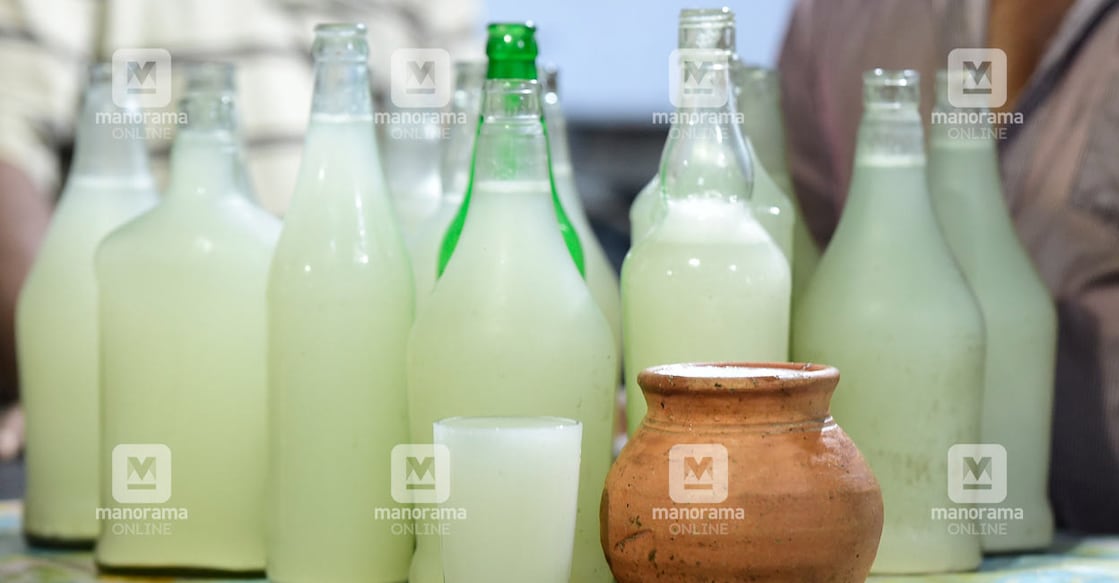'Kerala's new liquor policy should protect toddy tappers': AITUC to launch stir

Mail This Article
Kochi: The All India Trade Union Congress (AITUC) has decided to launch a public protest against the new liquor policy which was approved by the Cabinet on Wednesday.
The AITUC is against certain decisions listed in the new liquor policy involving the toddy sector. A area-wise strike against the policy will be organised on Friday.
"The new liquor policy should have amendments to protect the traditional toddy tappers," AITUC general secretary K P Rajendran told Manorama News.
"The new policy does not mention the formation of a toddy board. The proposed changes should be implemented after the establishment of a toddy board. Toddy should be tapped by authorised personnel only," he said.
He expressed disappointment that the new policy did nothing to alter the minimum distance requirement imposed on toddy shops.
According to Rule 7(2) of the Kerala Abkari Shops Disposal Rules 2002, no toddy shops shall be located within 400 m and no foreign liquor-1 shops shall be located within 200 m from an educational institution, temple, church, mosque, burial ground and scheduled caste/scheduled tribes colonies.
New liquor policy
The Kerala government gave its nod on Wednesday to a new liquor policy promoting the production and sale of traditional toddy across the state and proposing to manufacture the maximum quantity of foreign liquor and beer within the state. A cabinet meeting chaired by chief minister Pinarayi Vijayan approved the liquor policy for the years 2023-24 on Wednesday, a CMO statement said.
Excise minister M B Rajesh said the new policy mainly covers three aspects, including the toddy sector, foreign liquor, and the government's anti-liquor and drug campaign. Potential areas would be identified in each area of the state, and toddy production would be promoted there, he said.
Toddy
"Toddy production will be promoted in all parts of Kerala on a plantation basis... Toddy produced in the state will be branded as Kerala Toddy," Rajesh said.
Instead of throwing away the excess toddy after the respective days' sale, all-women network Kudumbashree would be entrusted with the task of making value-added products like vinegar from it, he said. A track-and-trace system would also be implemented to accurately monitor the transportation of toddy in the state, he explained.
Bar licences
Under the policy, the fee for issuing bar licences would be increased to Rs 35,00,000 from the present Rs 30,00,000, Rajesh said. A mechanism would also be put in place to manufacture the maximum quantity of foreign liquor and beer within the state, the minister added. Necessary arrangements would be made in the existing rules for the promotion of the export of Indian-made foreign liquor (IMFL), Rajesh said, adding that exorbitant registration and export fees, which adversely impact liquor exports, would be restructured to encourage it. Necessary legislation would also be made to produce and distribute mild alcohol and wine from fruits available in the state, he said.
Stating that as many as 559 foreign liquor outlets are permitted in the state, he said only 309 of them are in operation and steps will be taken to open the remaining ones. An amendment to the existing rules to serve foreign liquor in IT parks is in progress as well, he said. Similarly, rules would be framed in consultation with the industries department to issue licences to serve liquor on eligible premises in IT-like industrial parks, the minister added.
The new liquor policy proposes to further strengthen 'Vimukthi', the government's ambitious campaign against the use of liquor and narcotic substances, particularly by school students.

